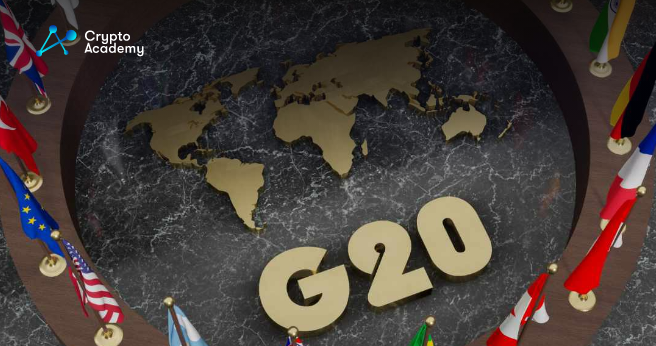G20 countries discuss crypto regulation, with India requesting IMF and FSB to produce a technical paper on crypto.
Leaders of the G20 group of countries have pledged to continue cooperation for a globally fair, sustainable, and modern international tax system, crypto regulation, etc.
The G20 is a group of 20 major economies, including both developed and emerging countries, that accounts for more than 80% of global GDP and trade. The G20 Finance Ministers and Central Bank Governors Meeting is one of the key events of the G20’s annual calendar. It provides a platform for members to discuss pressing economic and financial issues, exchange views, and coordinate policies.
India, currently holding the G20 Presidency, has made a significant move in the regulation of crypto assets. They requested the IMF and FSB to produce a technical paper on crypto assets. The paper will be presented during the 4th Finance Ministers and Central Bank Governors Meeting scheduled for October 2023. The technical paper will synthesize the macroeconomic and regulatory perspectives of crypto-assets. This may aid in formulating a well-coordinated and comprehensive policy approach toward them. This move is crucial given the absence of a global policy framework for crypto-assets. Policymakers remain “concerned” over the greater interconnectedness between the crypto and traditional financial sectors.
The Indian Presidency requested that the IMF prepare a discussion paper on the macroeconomic implications of crypto assets. That will serve to inform policymakers. At the 2nd G20 Finance and Central Bank Deputies Meeting held in Bengaluru, a seminar titled “Policy Perspectives: Debating the Road to Policy Consensus on Crypto Assets” was held. The discussions revolved around various topics. Those include the need for a common tax system, the benefits and risks of crypto assets, macroeconomic policy questions that need evaluation, financial stability issues, etc.
G20 on Crypto Adoption
Tommaso Mancini-Griffoli, the IMF speaker, presented the discussion paper during the event. Also, he outlined the consequences of crypto adoption on a country’s economy’s internal and external stability as well as its financial system’s structure. The purported benefits of crypto assets include cheaper and faster cross-border payments, more integrated financial markets, and increased financial inclusion. However, these benefits are yet to be realized. According to him, problems with interoperability, safety, and efficiency cannot be guaranteed by the private sector. He also emphasized that critical digital infrastructure/platforms for ledgers should be viewed as a public good.
The G20 discussions on crypto assets will broaden beyond financial integrity concerns to capture the macroeconomic implications and widespread crypto adoption in the economy. But, this will require a data-based and informed approach to global challenges and opportunities of crypto assets. Nonetheless, that may allow G20 members to shape a coordinated and comprehensive policy response. All in all, the event has initiated a broader dialogue on crypto assets. But, policymakers and regulators need to evaluate several pertinent policy questions closely.
There is an existential question on whether crypto assets are the optimal solution for existing challenges in global financial systems. The global standard-setting bodies such as the Financial Action Task Force (FATF), Financial Stability Board (FSB), Committee on Payments and Market Infrastructures (CPMI), International Organization of Securities Commissions (IOSCO), and Basel Committee on Banking Supervision (BCBS) have been coordinating the regulatory agenda while working within their respective institutional mandates. However, there is a need to build a deeper understanding of the interlinkages, opportunities, and risks pertaining to crypto assets under the aegis of the G20.
G20 on Crypto Regulation
On the issue of crypto assets, the G20 welcomed ongoing work by the Financial Stability Board (FSB) and international standard-setters. That includes work on stablecoins, which are closely monitored and subject to robust regulation, supervision, and oversight to mitigate potential risks to financial stability. Moreover, the leaders urged the FSB to finalise its high-level recommendations on the regulation, supervision, and oversight of global stablecoins and crypto-asset markets and activities by July 2023. They also welcomed the FSB’s analytical report on decentralised finance (DeFi). Additionally, they looked forward to the FSB’s high-level recommendations for the supervision and regulation of stablecoins and crypto assets, respectively by the third meeting in 2023.
Of course, the crypto community was not keen to hear about the potential of tight regulation. Instead, some even started concluding that the G20 countries are planning to “ban” cryptocurrencies.
Here are the key points from the G20 meeting regarding crypto assets:
- Acknowledgment of crypto assets: The G20 acknowledged that crypto assets have the potential to contribute to financial innovation and efficiency.
- Mitigating risks: The G20 recognized the need to mitigate risks associated with crypto assets. That includes consumer and investor protection, market integrity, tax evasion, money laundering, and terrorist financing.
- International cooperation: The G20 emphasized the importance of international cooperation in addressing the risks associated with crypto assets.
- Regulating crypto assets: The G20 stated that they will regulate crypto assets in line with the Financial Action Task Force (FATF) standards.
- Advancing technology: The G20 called for the development of technological innovations to enhance the efficiency and resilience of the financial system while mitigating risks.
- Monitoring developments: The G20 emphasized the need for ongoing monitoring of developments in the crypto asset market and their implications for the financial system.

